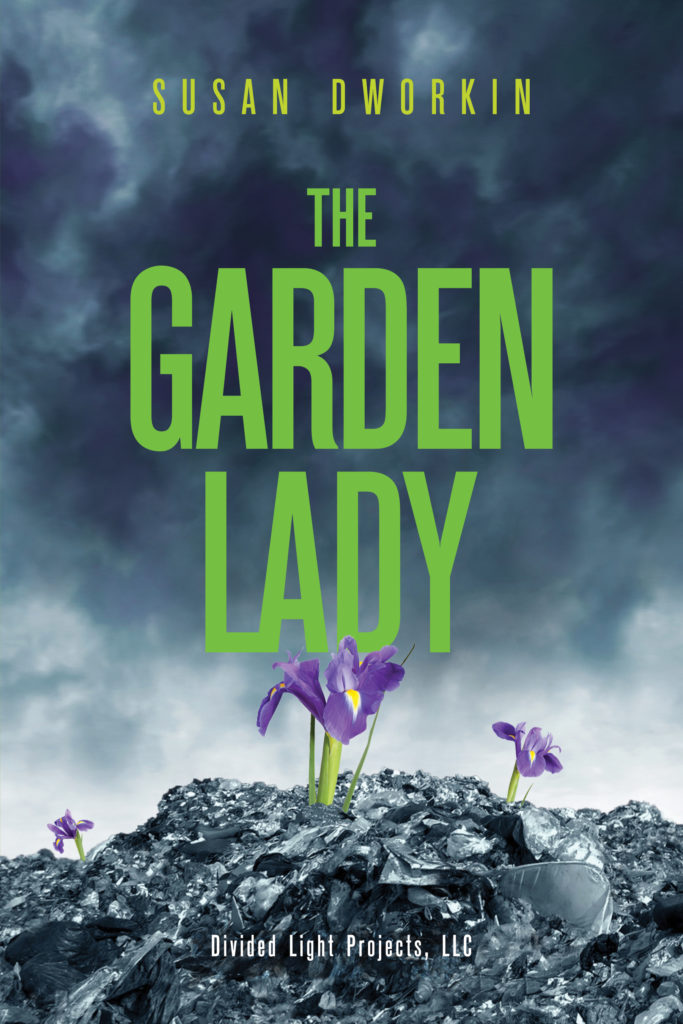About the book, The Garden Lady
- Paperback: 220 pages
- Publisher: Susan Dworkin (July 18, 2018)
THE GARDEN LADY by Susan Dworkin is a novel about unexpected love, the silence that becomes complicity, and the magic of redemption. Urgent and compelling, the story resonates with today’s headlines as it poses the ethical question: How do we live with what we know but choose not to think about or act upon?
Maxie Dash, the heroine of THE GARDEN LADY, is a famous beauty, a fashion icon, the face of many national TV ads. Her first husband, a world-class photographer, took nude pictures of her, which are so beautiful that they now hang in museums.
On the cusp of her 50s, Maxie decides to make one more marriage, something permanent and restful, to a rich man who will guarantee her an affluent life and future security. Amazingly she finds the perfect man. Even more amazingly, she grows to love him. Albert shares Maxie’s passion for the opera and willingly supports her favorite charities. He indulges her delight in public gardens and allows her to endow the community with their beauty. All he asks in return is that she give him her love and her unswerving loyalty and agree to know nothing — absolutely nothing — about his business.
Maxie is sustained by her best friend, the designer Ceecee Rodriguez, whom she treasures as a sister. But she is shaken by the persistent enmity of Sam Euphemia, a fierce young business executive, who suspects Albert of terrible crimes.
Add Maxie Dash to the list of great heroines of contemporary fiction. Smart, funny, enjoying every moment of her hard-won success, she ultimately faces the truth about her life, moves past denial and realizes that “her loyalty was a side effect of her greed and her greed was a crime against nature and her silence, her willful, terror-stricken silence, the true disaster.” Her attempt to turn Garbage Mountain, a New Jersey landfill, into a beautiful park is key to her redemption.
THE GARDEN LADY reads like a thriller or a binge-worthy Netflix series. Entertaining and provocative, it is packed with ethical questions, dark humor and insight and offers us a female protagonist you will never forget.
Buy, read, and discuss this book:
Amazon | Barnes & Noble | IndieBound | Goodreads
About the author, Susan Dworkin
 SUSAN DWORKIN wrote the New York Times bestseller The Nazi Officer’s Wife, a tale of love and terror in the Third Reich, with the woman who lived the story, the late Edith Hahn Beer Other books include Making Tootsie, the inside story of the great film comedy with Dustin Hoffman and Sydney Pollack; The Viking in the Wheat Field about the eminent seed banker, Dr. Bent Skovmand; Miss America, 1945, Bess Myerson’s story; Stolen Goods, a novel of love and larceny in the 80s; and The Commons, about an agrarian revolt led by a pop star and set in the not-so-distant future. Susan was a long-time contributing editor to Ms. Magazine. Her plays are often performed in regional theatres. She lives in Massachusetts.
SUSAN DWORKIN wrote the New York Times bestseller The Nazi Officer’s Wife, a tale of love and terror in the Third Reich, with the woman who lived the story, the late Edith Hahn Beer Other books include Making Tootsie, the inside story of the great film comedy with Dustin Hoffman and Sydney Pollack; The Viking in the Wheat Field about the eminent seed banker, Dr. Bent Skovmand; Miss America, 1945, Bess Myerson’s story; Stolen Goods, a novel of love and larceny in the 80s; and The Commons, about an agrarian revolt led by a pop star and set in the not-so-distant future. Susan was a long-time contributing editor to Ms. Magazine. Her plays are often performed in regional theatres. She lives in Massachusetts.
Connect with Susan:
Find out more about Susan at her website.
My Thoughts 
For a relatively short, fast-paced novel, Susan Dworkin packed a lot of story into The Garden Lady. It’s got a tragic childhood, a hard luck, rags-to-riches tale, a revenge saga, family drama, international smuggling and corporate crime, and passionate love affairs, all within 220 pages. If that seems overwhelming, fear not, because this tale is well told.
Dworkin excels at setting up characters with just a few phrases, and makes us see them from the moment of their first lines of dialogue. We know Maxie fears aging in solitude, we know her best friend Ceecee is fiercely loyal, we know the former has a tendency to choose men who are bad for her, until her first husband, whom we never meet “on camera” and only learn about in the final chapters of the novel (a pity, because his presence is felt throughout the book) and we know Ceecee’s husband is a truly good man, who gives good advice.
And yet, as much as this novel is about Maxie and her push to build a memorial garden, it’s also about her last husband, Albert. Mysterious, rich, dangerous, involved in dubious business practices that Maxie chooses not to see, Albert is the point around which this story pivots, while Maxie is the observer and the observed.
While it’s typical for protagonists to be the heroes of their own stories, I felt as though Maxie, more often than not, was a prisoner of her own life. True, it was by choice. But a gilded cage you enter willingly is still, in the end, a cage. Even when she faces a potential nemesis in the form of Sam Euphemia, who suspects the truth of Albert’s business dealings, Maxie keeps her eyes closed, until, finally, she must force them open.
In many ways this novel is about awakenings – Maxie’s own awakening to her needs as a woman, as a wife, as a person – but it’s also about family. The families we are born to, and the families we choose.
It’s an interesting, if quirky, novel. Fast, compelling, and a bit unsettling, but I think that’s the intent.
Goes well with: an ante-pasta plate and red wine.
Tour Stops 
Friday, March 22nd: Jathan & Heather
Monday, March 25th: Bibliotica
Tuesday, March 26th: Instagram: @book.hang.o.ver
Wednesday, March 27th: Life By Kristen
Friday, March 29th: A Chick Who Reads
Monday, April 1st: Eliot’s Eats
Tuesday, April 2nd: Jennifer ~ Tar Heel Reader
Thursday, April 4th: Wining Wife
Monday, April 8th: bookchickdi
Thursday, April 11th: Ms. Nose in a Book
Friday, April 12th: Broken Teepee


